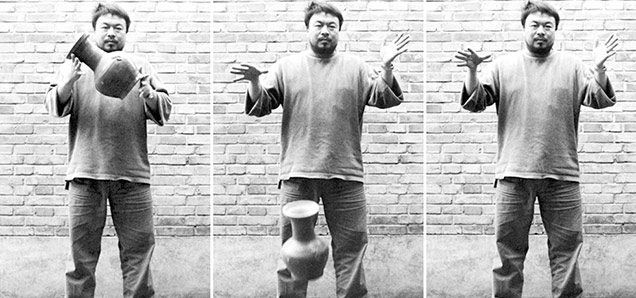ARTiculation: A voice for the voiceless
 CREDIT: AI WEI WEI
CREDIT: AI WEI WEIAi Wei Wei�s 1995 work �Dropping a Han Dynasty Urn.�
“Say what you say plainly, and then take responsibility for it.” —
Ai Wei Wei Ai Wei Wei, a contemporary artist rapidly growing in influence, has long been standing up for the underdog — the creative spirits who wish to speak, but are silenced by authority.
Freedom of expression is something that doesn't exist in many places around the world, chief among them Wei Wei's home country of China. Born in mid-century Beijing, Wei Wei was birthed with the taste of oppression bitter in his mouth. As he matured into an adult (something he believes is enough of a reason for one to take responsibility for their own morality), he chose to pursue a career in art. With strong ideas about the misdemeanour being conducted within the societal structure of China, he set out to provide something that was nearly non-existent: public social commentary.
* * *
A rustic, beautifully curved vase from the Han dynasty sits atop the mahogany desk. It commands a distinguished presence. Wherever it is, there is power. Ai Wei Wei picks it up and drops it, leaving it shattered on the ground.
The White House is perched atop the crisp, green grass of Pennsylvania Avenue. The American Dream sits behind the gates. Wei Wei photographs himself flipping it off.
An earthquake caused by the world's largest power station (Three Gorges Dam) kills thousands of schoolchildren. The government of China refuses to acknowledge the tragedy. Wei Wei spends a year compiling a list of the casualties' names and commemorates them at one of his shows.
* * *
As Wei Wei's audience grew and the ideology of his artwork (and those who have followed in his iron footsteps) opened up the floodgates for civilians to speak their truths. There was a dull hum of creative revolution in the making, with Wei Wei at the helm of the ship. And then he disappeared.
Prior to 2010, it was widely accepted by his following that Wei Wei was nearly invincible to the powers that be in China. But when he was placed under house arrest for planning to peacefully protest the needless demolition of a building he recently designed, his followers took his place and held a party at the site. So when he went missing in 2011, and it was revealed that the government had captured him, only a louder cry was heard from his audience.
Ai Wei Wei had been working to defend people's right to freedom of expression his whole adult life. To encourage people to say what they want and to take responsibility for their lives. He had led by example, and was confronting what he knew to be inevitable — facing the dragon of oppression head-tohead. Only he wasn't alone. With his voice silenced, the impact he has had was evident as people began to speak his message. The people whose voices he helped muster were now belting at the top of their lungs in defence of him. The Internet quickly became a battlefield. People took to social media outlets, storming Twitter and Facebook with messages pleading for his release. Numerous campaigns were started, including websites and petitions. People spoke about it, wrote about it, sang about it and a painted about it. And finally, after 81 days in captivity, he was released. A wave of exhalation swept the art world.
Ai Wei Wei is still unable to leave China, having had to surrender his passport. But his (and many of his contemporaries) echo is felt here in our critical thought and ability to express it in whatever medium we choose. The consequence of our bravery for ourselves is uncertain, but what we can be sure of is that when it reaches someone who needs to hear it, it is worth it.
To commemorate his dedication, Ai Wei Wei's exhibit ‘According to What?' is at the Art Gallery of Ontario in Toronto until October 27. I highly, highly recommend it.
Editorial opinions or comments expressed in this online edition of Interrobang newspaper reflect the views of the writer and are not those of the Interrobang or the Fanshawe Student Union. The Interrobang is published weekly by the Fanshawe Student Union at 1001 Fanshawe College Blvd., P.O. Box 7005, London, Ontario, N5Y 5R6 and distributed through the Fanshawe College community. Letters to the editor are welcome. All letters are subject to editing and should be emailed. All letters must be accompanied by contact information. Letters can also be submitted online by clicking here.













